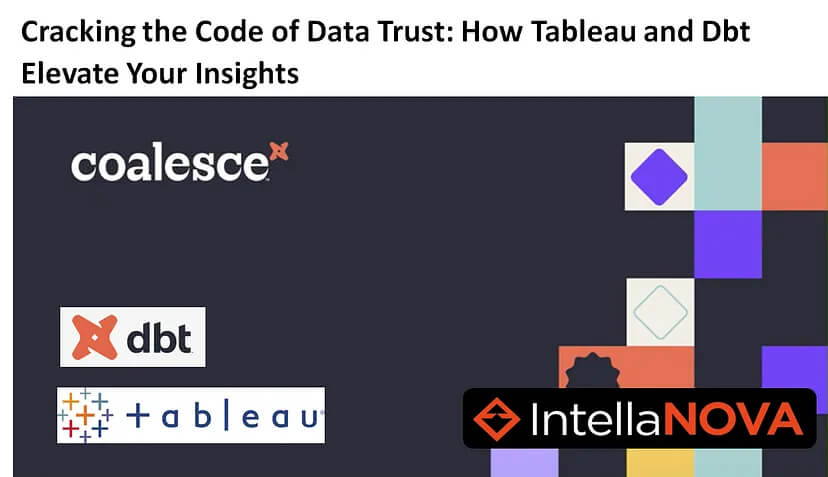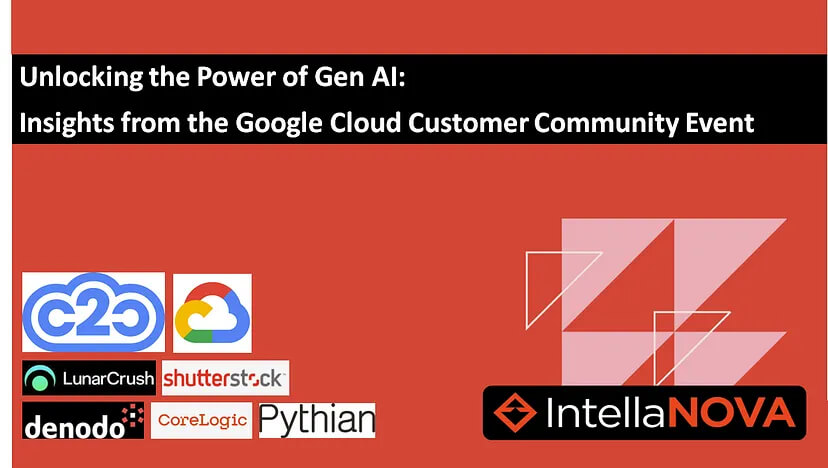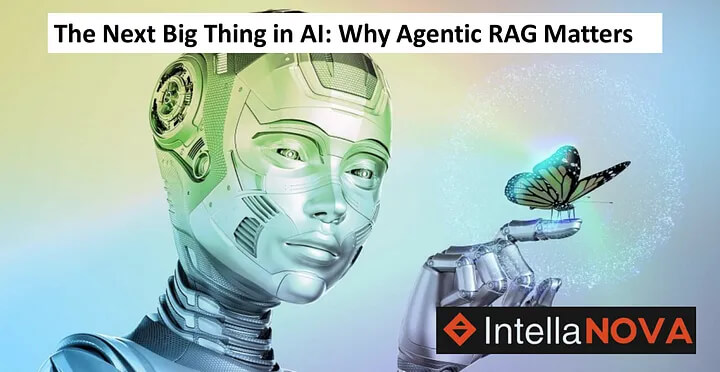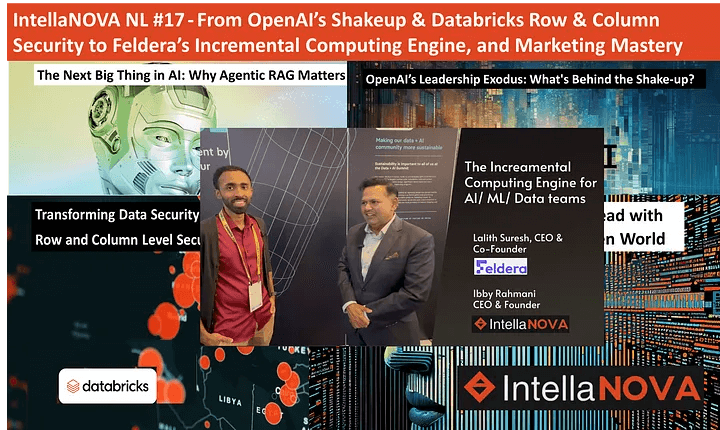
IntellaNOVA Newsletter #17 — From OpenAI’s Shakeup & Databricks Row & Column Security to Feldera’s Incremental Computing Engine, Agentic DAG and Marketing Mastery
OpenAI’s Leadership Exodus: What’s Behind the Shake-up?
OpenAI, a leading AI firm, is facing considerable turbulence with recent high-profile departures, including cofounders John Schulman and Greg Brockman, and product leader Peter Deng, amid increasing competition from Google and Meta. This shake-up, following earlier exits of other key figures like Andrej Karpathy and Jan Leike, has sparked concerns about the company’s future direction and potential internal issues. Despite these setbacks, OpenAI’s new voice feature has received positive feedback, offering a glimmer of hope for stabilizing their market position. These changes might signify a strategic realignment or a broader reset to adapt to the evolving AI landscape and maintain competitiveness.
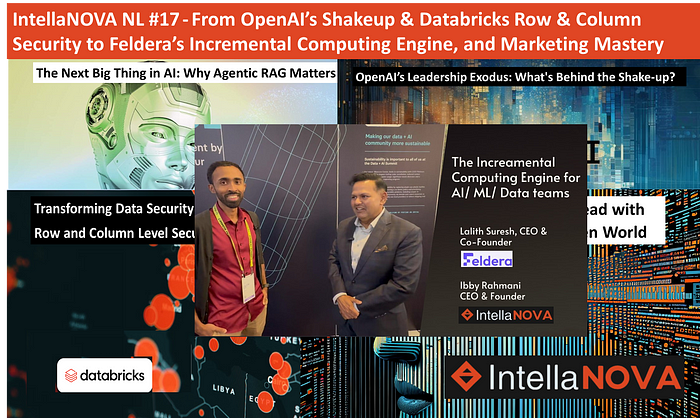
Feldera: The Only Incremental Compute Engine for AI, ML, and Data Teams
At the Databricks AI Summit, I had the pleasure of speaking with Lalit Suresh, CEO and Founder of Feldera, about their groundbreaking technology that rapidly analyzes live and historical data using full SQL, streamlining feature engineering, real-time fraud detection, and operational analytics. Feldera excels in batch analytics by solving a critical industry challenge: avoiding the inefficiency of reprocessing massive datasets for minor updates. Their technology efficiently captures and processes only new data changes, reducing the need for complex pipelines. By allowing users to write a SQL query once and automatically managing data evolution, Feldera simplifies data management and significantly enhances feature engineering for machine learning. This unified platform empowers data scientists and engineers to focus on innovation, making data management seamless and efficient.
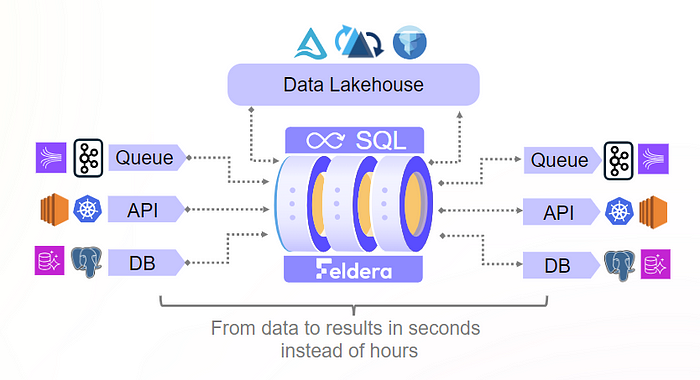
The Next Big Thing in AI: Why Agentic RAG Matters
Agentic RAG (Retrieval-Augmented Generation) represents a significant leap in AI technology, transforming standard RAG systems into advanced, autonomous agents that not only retrieve information but also make decisions and achieve specific goals. Unlike traditional systems that lack deep contextual understanding, Agentic RAG is highly context-aware, capable of recalling past interactions, adapting its responses based on history, and predicting future needs. This system revolutionizes data retrieval by dynamically assessing queries, intelligently gathering information from multiple sources, and ensuring accuracy through post-generation verification. With its ability to learn and improve over time, Agentic RAG offers a powerful, personalized tool for efficiently managing and retrieving data, pushing the boundaries of what AI can achieve.
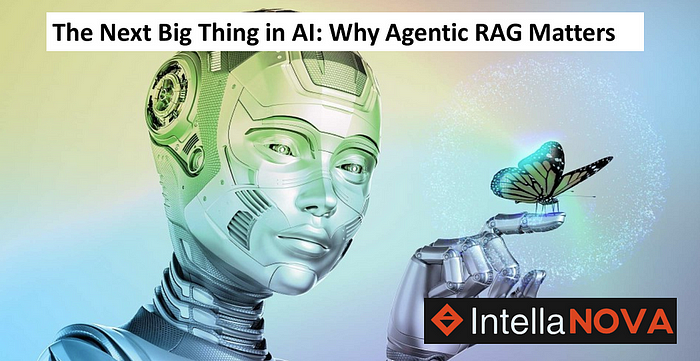
Transforming Data Security: Introducing Row and Column Level Security with Databricks Unity Catalog
Databricks has introduced Row and Column Level Security in its Unity Catalog, marking a significant advancement in data security. This new feature, which includes Mask Row Filters and Column Masks, allows organizations to implement fine-grained access controls across AWS, Azure, and GCP, addressing the complexities of secure data sharing with precision. As organizations scale, traditional coarse-grained controls fall short, often exposing sensitive data to unauthorized users and complicating permission management. Databricks’ solution streamlines data access by applying Row Filters and Column Masks, ensuring that only relevant data is visible to the appropriate users while safeguarding sensitive information. This approach not only enhances security but also simplifies data access management, reducing operational overhead and maintaining compliance with data privacy regulations.

Future-Proofing Your Data Product in an AI-Driven World
To future-proof your data product in an AI-driven world, focus on adaptability by ensuring your product integrates evolving AI technologies seamlessly. Enhance features with AI, such as predictive analytics, and build trust through transparency in data privacy and security. Position your brand as an AI thought leader by publishing insightful content and engaging with your audience. Foster a community of innovators for knowledge sharing and invest in continuous learning for your team. Highlight real-world success stories to demonstrate the practical benefits of your product and maintain its competitive edge.
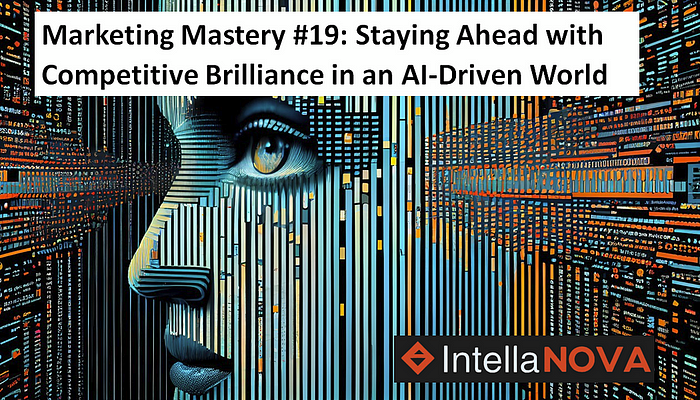
OpenAI’s Leadership Exodus: What’s Behind the Shake-up?
OpenAI, a leading AI firm, is facing considerable turbulence with recent high-profile departures, including cofounders John Schulman and Greg Brockman, and product leader Peter Deng, amid increasing competition from Google and Meta. This shake-up, following earlier exits of other key figures like Andrej Karpathy and Jan Leike, has sparked concerns about the company’s future direction and potential internal issues. Despite these setbacks, OpenAI’s new voice feature has received positive feedback, offering a glimmer of hope for stabilizing their market position. These changes might signify a strategic realignment or a broader reset to adapt to the evolving AI landscape and maintain competitiveness.

Feldera: The Only Incremental Compute Engine for AI, ML, and Data Teams
At the Databricks AI Summit, I had the pleasure of speaking with Lalit Suresh, CEO and Founder of Feldera, about their groundbreaking technology that rapidly analyzes live and historical data using full SQL, streamlining feature engineering, real-time fraud detection, and operational analytics. Feldera excels in batch analytics by solving a critical industry challenge: avoiding the inefficiency of reprocessing massive datasets for minor updates. Their technology efficiently captures and processes only new data changes, reducing the need for complex pipelines. By allowing users to write a SQL query once and automatically managing data evolution, Feldera simplifies data management and significantly enhances feature engineering for machine learning. This unified platform empowers data scientists and engineers to focus on innovation, making data management seamless and efficient.

The Next Big Thing in AI: Why Agentic RAG Matters
Agentic RAG (Retrieval-Augmented Generation) represents a significant leap in AI technology, transforming standard RAG systems into advanced, autonomous agents that not only retrieve information but also make decisions and achieve specific goals. Unlike traditional systems that lack deep contextual understanding, Agentic RAG is highly context-aware, capable of recalling past interactions, adapting its responses based on history, and predicting future needs. This system revolutionizes data retrieval by dynamically assessing queries, intelligently gathering information from multiple sources, and ensuring accuracy through post-generation verification. With its ability to learn and improve over time, Agentic RAG offers a powerful, personalized tool for efficiently managing and retrieving data, pushing the boundaries of what AI can achieve.

Transforming Data Security: Introducing Row and Column Level Security with Databricks Unity Catalog
Databricks has introduced Row and Column Level Security in its Unity Catalog, marking a significant advancement in data security. This new feature, which includes Mask Row Filters and Column Masks, allows organizations to implement fine-grained access controls across AWS, Azure, and GCP, addressing the complexities of secure data sharing with precision. As organizations scale, traditional coarse-grained controls fall short, often exposing sensitive data to unauthorized users and complicating permission management. Databricks’ solution streamlines data access by applying Row Filters and Column Masks, ensuring that only relevant data is visible to the appropriate users while safeguarding sensitive information. This approach not only enhances security but also simplifies data access management, reducing operational overhead and maintaining compliance with data privacy regulations.

Future-Proofing Your Data Product in an AI-Driven World
To future-proof your data product in an AI-driven world, focus on adaptability by ensuring your product integrates evolving AI technologies seamlessly. Enhance features with AI, such as predictive analytics, and build trust through transparency in data privacy and security. Position your brand as an AI thought leader by publishing insightful content and engaging with your audience. Foster a community of innovators for knowledge sharing and invest in continuous learning for your team. Highlight real-world success stories to demonstrate the practical benefits of your product and maintain its competitive edge.


